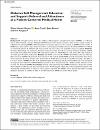Diabetes Self-Management Education and Support: Referral and Attendance at a Patient-Centered Medical Home
التاريخ
2020البيانات الوصفية
عرض كامل للتسجيلةالملخص
Background: Although evidence shows that diabetes self-management education and support (DSMES) is an effective tool to help individuals with type 2 diabetes (T2DM) improve their health outcomes, there remains a large number of individuals not attending DSMES. Understanding how frequently patients receive referrals to DSMES and the number of DSMES hours they receive is important to determine, as well as patients' health outcomes of utilizing DSMES. This will help us understand patterns of utilization and the outcomes that occur when such a valuable resource is utilized. Methods: Secondary data analysis was conducted of patient electronic medical records at a primary healthcare federally qualified clinic and 2 area hospitals. We identified 105 adult patients with a new T2DM diagnosis with at least 2 A1c lab results 3 to 12 months apart during the study period. Results: Only 53.5% were referred to DSMES. Out of those who were referred, 66% received no DSMES, 17% received 1-hour assessment, 4% received partial DSMES, and 13% received 8 or more hours. Linear regression of percent change in A1c and number of DSMES hours received, revealed that receiving 1 (P =.001) or 8 or more hours of DSMES (P =.022) had a significant negative relationship with the percent difference in A1c compared to the group who received no DSMES. Patients who had an hour of assessment had a similar percent reduction in A1c to those who had partial DSMES. Conclusion: Referral rates and enrollment in DSMES remain low. Those who enrolled often dropped out after the one-hour assessment session. Results suggest making the one-hour assessment session more educationally comprehensive or longer to retain patients. Improving the DSMES referral process and further investing physicians' decisions on whether to refer or not refer patients to DSMES are key for future studies.
المجموعات
- الصحة العامة [509 items ]


